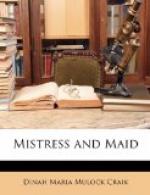“Not at all. Tell him to come at once. I am not like my sister; we always allow ‘followers.’ I think a mistress stands in the relation of a parent, for the time being; and that can not be a right or good love which is concealed from her, as if it were a thing to be ashamed of.”
“I think so too. And I’m not a bit ashamed of Tom, nor he of me,” said Elizabeth, so energetically that Miss Hilary smiled.
“Very well; take him to have his tea in the kitchen, and then bring him up stairs to speak to my sister and me.”
At that interview, which of course was rather trying, Tom acquitted himself to every body’s satisfaction. He was manly, modest, self-possessed; did not say much—his usual talkativeness being restrained by the circumstances of the case, and the great impression made upon him by Miss Hilary, who, he afterward admitted to Elizabeth, “was a real angel, and he should write a poem upon her.” But the little he did say gave the ladies a very good impression of the intelligence and even refinement of Elizabeth’s sweet-heart. And though they were sorry to see him look so delicate, still there was a something better than handsomeness in his handsome face, which made them not altogether surprised at Elizabeth’s being so fond of him. As she watched the young couple down Richmond Street, in the soft summer twilight—Elizabeth taking Tom’s arm, and Tom drawing up his stooping figure to its utmost extent, both a little ill-matched in height as they were in some other things, but walking with that air of perfect confidence and perfect contentedness in each other which always betrays, to a quick eye, those who have agreed to walk through the world together—Miss Hilary turned from the window and sighed.
CHAPTER XXIII.
Following Miss Hilary’s earnest advice that every thing should be fair and open, Elizabeth, on the very next day after that happy Whit-Monday, mustered up her courage, asked permission to speak to her mistress, and told her she was going to be married to Tom Cliffe: not immediately, but in a year’s time or so, if all went well.
Mrs. Ascott replied sharply that it was no affair of hers, and she could not be troubled about it. For her part she thought, if servants knew their own advantages, they would keep a good place when they had it, and never get married at all. And then, saying she had heard a good character of her from the housekeeper, she offered Elizabeth the place of upper house-maid, a young girl, a protegee of the housekeeper’s, being substituted in hers.
“And when you have sixteen pounds a year, and somebody to do all your hard work for you, I dare say you’ll think better of it, and not be so foolish as to go and get married.”
But Elizabeth had her own private opinion on that matter. She was but a woman, poor thing! and two tiny rooms of her own, with Tom to care for and look after, seemed a far happier home than that great house, where she had not only her own work to do, but the responsibility of teaching and taking charge of that careless, stupid, pretty Esther, who had all the forwardness, untidiness, and unconscientiousness of a regular London maid-servant, and was a sore trial to the staid, steady Elizabeth.




